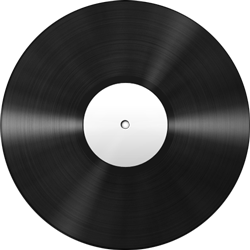In my last blog post, we talked about the old arguments of analog verses digital recording. To demonstrate the ideas, I talked about the wax cylinder and what it was like when I actually got a chance to be recorded on one.
It is essential that we understand the past if we are going to have any control of the future.
So, first, if you can, search the web and try to find any audio files of a most excellent radio program from the BBC called “Gramophones and Grooves”. In program 1 of this 5 part series, David Owen Norris looks at the—yep, you guessed it— wax cylinder. From the archived BBC page:
“In the 1890s, wax cylinders (for the phonograph) and shellac discs (for the gramophone) were competing technologies in the world of sound recordings. Listeners can hear the voices of Thomas Edison, inventor of the phonograph and Emil Berliner, creator of the disc. David Owen Norris examines how successful music recordings on both media were dependent on the particular sound of the instruments concerned. There are examples of some of the best sounds - high-pitched xylophone, cornet and the human whistle, not forgetting bands. The greatest of them all - Sousa's Band - receives special attention. David Owen Norris looks at the beginning of the indigenous British recording industry by descending into the basement of a pub near Covent Garden - this is where the legendary record producer Fred Gaisberg set up his first studio. His first artistes were found at a nearby restaurant and hotel. Interviewees: Cylinder collector Dominic Combe. Peter Martland of Cambridge University . Sam Brylawski, head of recorded sound at the Library of Congress, Washington DC.”
The take-a-way here is that in earlier recording tech, high pitch sounds were king. In today’s technology, many folks claim to be able to produce recordings from 20HZ to 20KHZ, which in theory is the range of human hearing. I am not going to discuss in this post the differences between analog tape and why some love and some hate it, but tape surely has its place! Were the blank tape, 2 inch tape recorders, and maintenance more cost effective, I would record that way for all the tracking, then transfer to digital for mixing and editing.
However, these are the arguments we face in the current music business.
Let’s talk about the future of music and if it will eventually take the human factor totally out of music making or create an artistic utopia where the infinite variety of beings adapt music in profound ways we cannot now imagine.
A fascinating glimpse into this future comes from an article “Toward New Musics: What The Future Holds For Sound Creativity”, which says in part, “When recorded music was primarily distributed on physical media, finalizing a recording was an essential step. Now that music is primarily distributed over the Internet, this constraint has been lifted.” Read the full article here.
Perhaps a slightly more alarming future of music can be represented by the AI technology in iZotope’s Mix Assistant. While this plug-in certainly smacks of HAL 9000 and some infamous pod bay doors, I do want to make it clear that I am a big fan of iZotope and their plug-ins are truly remarkable. However, I’m not sure how I feel about automating the process of listening which is really at the heart of music creation and critical listening skills are…well, critical…for anyone who wants to compose and record music. Here is a glimpse of the kind of technology iZotope is promising: “Mix Assistant gives you a starting point for your mix by listening to it and automatically suggesting gain levels for all the tracks in your session.” Read the full tech specs here.
In conclusion, the choices we make today about what is and what is not music and what is and what is not art—two separate discussions—will have an incredible impact on the kind of music our descendants are listening to. While I am certainly interested in increased productivity and automating systems that allow mankind to focus on higher level thinking and exploration, I am not for turning the technology into the art form so that the music becomes secondary. What kind of world do we want to see and hear in the next 20 years? Will the computers be winning all the GRAMMYs?


